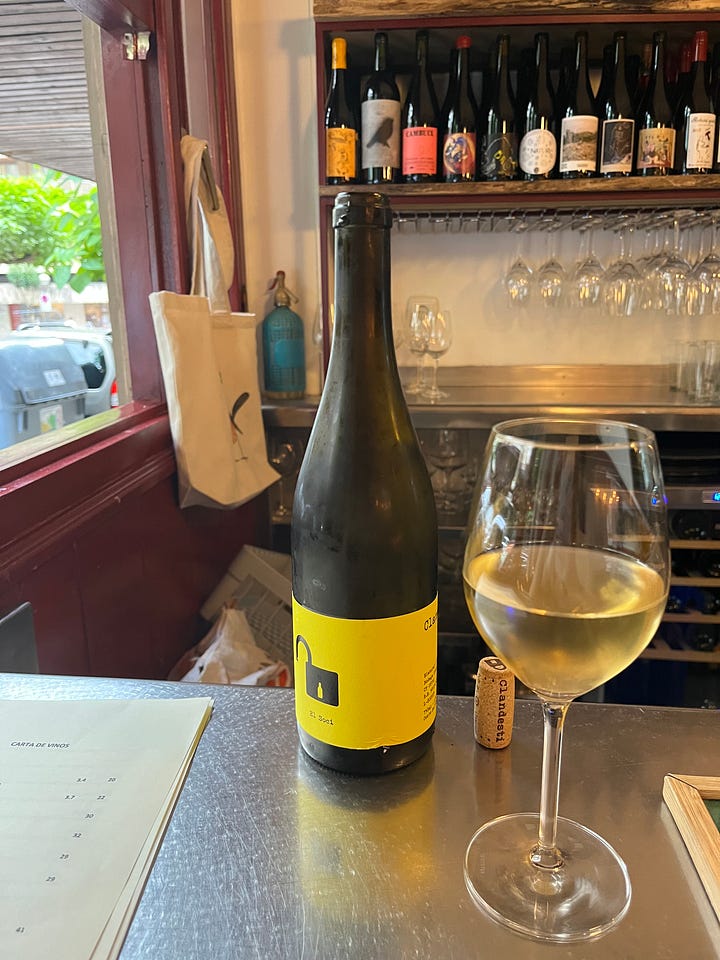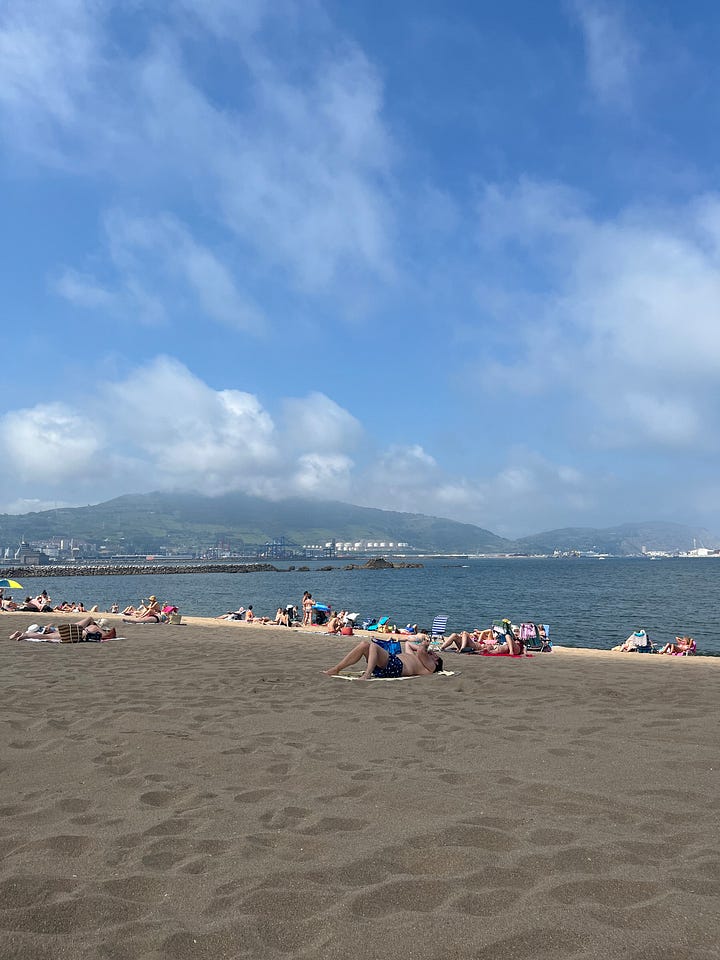It is perhaps the most dilettantish thing to start a newsletter and hardly ever put it out. I told you from the start, however, that this would be an “occasional” one, and I am making good on that promise.
It always seems like I will write more when I am abroad for the summer; there will surely be more to strike my interest, more to point to and say, ah, this or that glass of wine or famous painting is of note. It would surely be easier than writing a newsletter in Cambridge, where it would be a barebones account of lording over Dear Annie every night (ummmm, that actually sounds perfect). But I haven’t produced either thing, the Faubourg Saint-Antoine newsletter or the Mass Ave one. I can’t, in fact, bring myself to write anything at all.
Maybe it’s extreme procrastination brought on by self-imposed dissertation deadlines. But, no, it’s something more existential than that. In English departments, we covet the practice of “close reading”: of going line by line in paragraph or poem and performing an exegesis of every clause, metaphor, and semicolon in sight. But what am I even looking so closely at, and to what end? Why am I explicating so hard? I say all this as a staunch believer in and evangelist of close reading. But I have hit an impasse à propos de its purpose and, perhaps, the extreme labor that it requires. It’s a labor from which I can’t catch a break, as close reading is how I approach everything in life. I had a thought several glasses of txakoli deep across from the lovely crusty hippy behind the bar at Taska Beltz in Bilbao: With wine, why even try to describe it? Why try to put the taste to words—acid, dough, red currant, etc.—when drinking is a purely physical sensation, at first concentrated on the palate then emanating like a kind of warmth? Can’t we just let it be an aesthetic experience? Isn’t it the same with literature and, indeed, life?
Despite the pessimism about my relationship to the written word, I started journaling more this summer, first briefly in Paris, then Scotland, then Spain. On my first night abroad, K. brought me a tiny yellow moleskin notebook from a store that sells them wholesale on the Boulevard Voltaire. He had customized it with a label-maker-sticker inscription of my name. Maybe because the notebook was so small, I started recording simple snap shots. Moments that made me laugh: like when S. and K. and I were in a bistro and an old man kept letting loose an earth-rending sneeze every thirty seconds for literally twenty minutes. Or drinking Riesling with M. on a steep hillside in Belleville, ending the night a few more bottles deep, curbside with the BOH. Or waking to the sound of the sea in Brittany. Or pulling up to the Bastille métro platform and opening the door just before the train has come to a full stop.
This habit of notetaking turned into an intense practice of journaling when I made it to Spain—where I was presenting a paper on bullfighting at a Basque-region Hemingway conference. Everywhere I went, I started to record—the smell of cologne the French man, who was hitting on a group of tourist girls, sprayed with the bathroom door open at a bar in central Bilbao; the identical tired looks on faces of weathered American Hemingway fans who attended the conference; the bitter taste of Basque cider poured from massive vats high up in the mountains. Writing became a practice not of critique or close reading but more simply of documentation in solitude. That took the pressure off, perhaps. There was no audience. I started to write more slowly, too, working against the feeling that my pen had to be moving as fast as my thoughts, or even that my thoughts themselves had to be fast moving.
Anyway, we are back from all that now, and “actual” writing must be done. James Joyce calls, as does Dolores Haze, awaiting their entrance onto the stage of my dissertation. We find ourselves back in Child Library and at Dear Annie; in Elaine’s garden and Philip’s office; on the back roads, hidden trails, and grazing-horse hills of Virginia. The leaves are turning and something in the newly cool air smells perpetually of firewood.
A couple of brief updates: You might be able to find a couple copies of my zine, champagne, at Neighborhood Wines on Tremont. Please also peruse fiction, poetry, and visual art by some beautiful friends and colleagues in a special issue of Harvard Review on dance, which I edited this past year. More academic work and some writing about art to come. Stay tuned.
Okay! Let’s start with an amuse-bouche of Alexandre Dumas paired with a sip of David Sedaris. Two out-of-context excerpts that have been echoing in my head.
“Pray excuse me, madame,” replied Monte Cristo, “but I never eat Muscatel grapes.”
—Chapter 71, “Bread & Salt,” The Count of Monte Cristo
“When I do go back [to France], it's not like going from—I don’t know—having an audience to being anonymous. It's ‘Beneath the Planet of the Apes.’ It’s going from having an audience to being a foreigner, which is the lowest lifeform, to be a foreigner.”
—Episode 165: “Americans in Paris,” This American Life

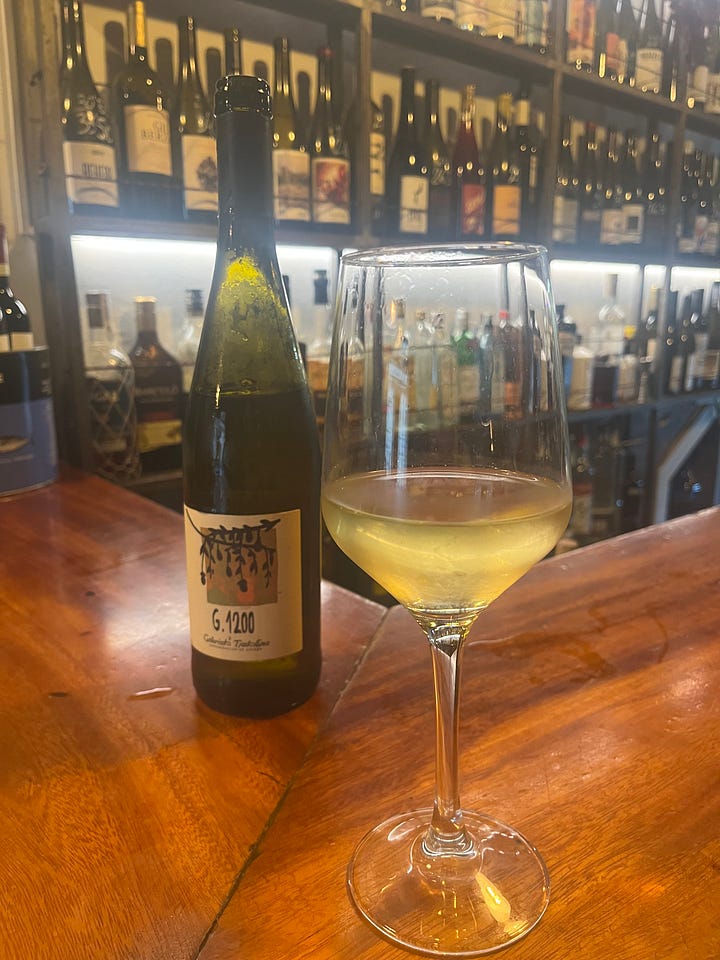
Field Notes: Harvesting with Spinning Wheel
A quick note about a day of harvest I worked this August with Spinning Wheel Wines, a small collective making the good stuff in and around the American mid-Atlantic. I’d heard talk of Spinning Wheel in New York and Boston and was delighted to see that they needed help with a short harvest about an hour away from my family’s house in the Shenandoah.
My dad took me up and over the mountain ridge early on the morning of the harvest (I can’t drive) and through an area of the National Park that had recently been damaged by wildfires. It looked like fall had come early, and the ground was dry and grey with ash. I met a contingent of the harvest crew at a Shell gas station on the edges of a derelict town that is still frozen in time since it was decimated by Confederates in the Civil War. Same buildings, zero growth. Absolutely no one there.
We harvesters drove about another forty minutes or so to the Lightwell Survey land, which sits across a rural highway from an austere looking building that, after a quick google search, proved to be the long-shuttered Augusta Military Academy. “Tuition, board, fuel, and lights. Positively no extras” was its motto, according to a local newsletter. Now, you can rent it out for Bible camps. We pulled up the gravel drive playing Enya with the windows down, reapplied sunscreen, and made our way over to a U-Haul, its back doors flung open to reveal a huge plastic vat already half full of grapes.
The white grapes, a hybrid variety called Chardenell, were almost already completely picked when we got there—by those who had joined the harvest from closer by or had camped out in the vines overnight. Most of the crew were friends or already knew each other. Others were locals in food and wine from Staunton, Charlottesville, and DC.
We got to work picking, inspecting, and hauling the red grapes: a varietal called Chambourcin, which is pronounced not like it might be in French, but instead with a hard American down-beat intonation: “Shambersen.” The berries tasted like black raspberries more than grapes and had a lovely pithy seed or two to spit out. We were on the lookout for black rot in individual berries—a sticky, syrupy substance that we tried not to spread over the whole clusters if found. I didn’t find much, but did meet a lot of snails and spiders. I couldn’t tell if they were aware of us disturbing their habitat, and I hope I left their homes intact. The Chambourcin vines themselves sat on a sloping hillside behind Lightwell’s brick family house, wood barn, and ancient pear tree. It was satisfying work that made my hips and arms sore the next day.

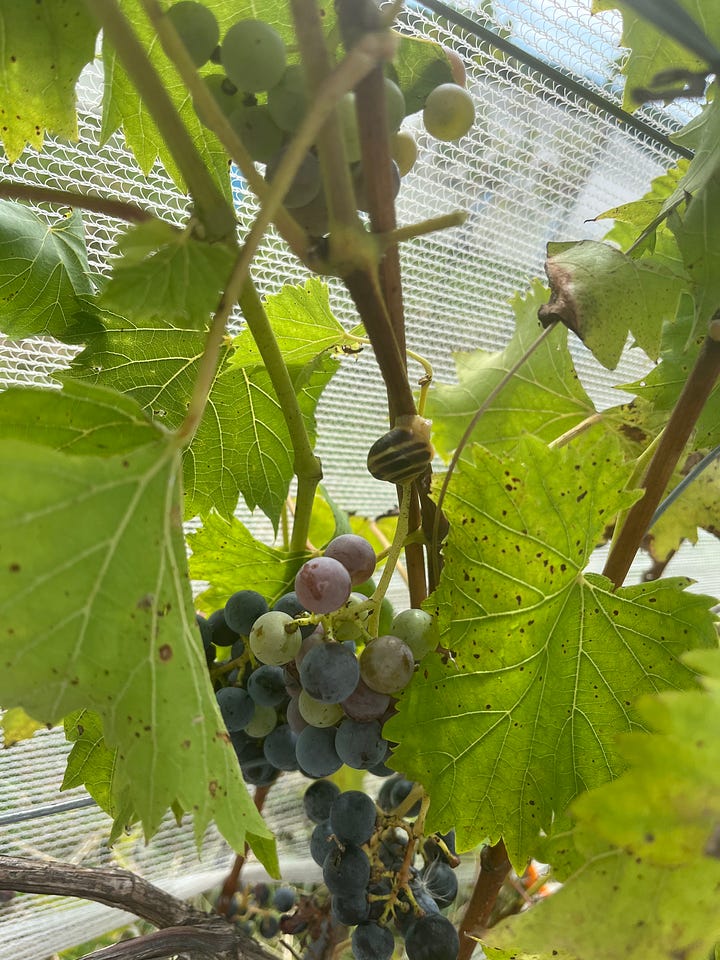
What an absolute miracle, too, that we were picking on the one temperate day of the whole Virginia summer, that the heat and humidity weren’t absolutely broiling. It got hot and sunny at one point, and I made the risky move to change from tick-safe pants to short shorts and ridiculously high socks. It was quick, short work with a bigger-than-expected crew, and we were done by lunchtime. Coolers of sandwiches and beers were set out on some big flat kind of tractor attachment, where we sat and ate as it started to rain.
Then back to the strange town with the Shell station, where I loitered and read every historical placard on main street, waiting to be picked up by my dad and his dog, Blue. Then a beer or two together to close out the day in Luray. I will definitely be sharing the wine with them whenever it lands for their share in the work as chauffeurs.
It was a perfect intro to harvesting and affirmed my desire to work longer vendages abroad when I can. I love wine, especially when it’s from a place where you live!

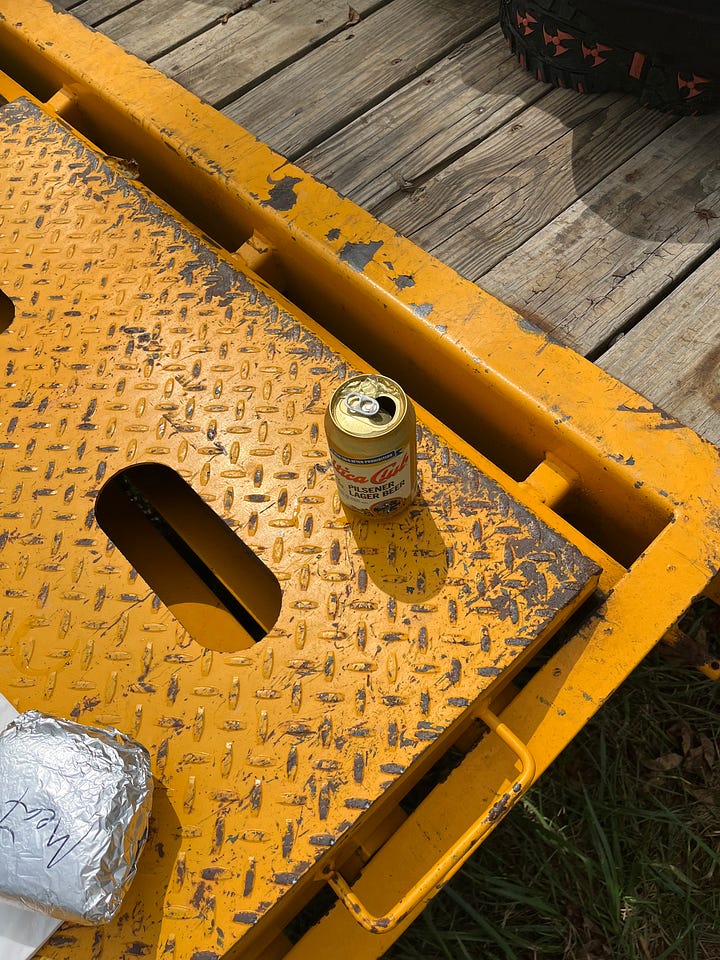
On Champagne in Crime & Punishment
Two great loves of my life: champagne and extremely long novels.
This August, in a back-to-Cambridge frenzy, my manic brain simply primed for Dostoevsky, I read Crime & Punishment. And there, I was surprised to find a strange marriage of these two earthly passions.
On its pages, you meet hardened criminals, street urchins, developmentally stunted women named Lizaveta, sickly law students, suspicious detectives, corrupt old women who steal money meant for charity, and lecherous men with neatly trimmed mutton chops. Dostoevsky’s St. Petersburg is dirty, cruel, and poor.
Raskolnikov, our anti-hero, stumbles out of his garret after waking from a few-day fever, which befell him after he committed the eponymous crime at the start of the novel. His drink of choice on these hallucinatory outings, regardless of his illness-induced low tolerance, is a tall glass of vodka. But everyone around Raskolnikov, especially those with upper-class ambitions, numb the pain of reality at a seemingly bottomless well of champagne.
Two major scenes center around its excessive consumption. First, Raskolnikov makes his way to a teahouse one morning to find recent papers that might have covered his crime. A group of four men are drinking champagne in the back, including Zametov, a young police clerk and member of the scuzzy Petersburg intelligentsia.
Flushed and ruddy-cheeked, Zametov approaches Raskolnikov who, between fever and drunkenness, accuses his peer of wringing his society friends dry:
“You must have a jolly life, Mr. Zametov; entrance free to the most agreeable places. Who’s been pouring champagne into you just now?”
“We’ve just been... having a drink together.... You talk about pouring it into me!”
“By way of a fee! You profit by everything!” Raskolnikov laughed, “it’s all right, my dear boy,” he added, slapping Zametov on the shoulder.
Champagne flows like social currency, and both Zametov and Raskolnikov are smart to that fact. Like Raskolnikov’s fever, champagne blurs the line between drunken folly and sober truth, guilt and innocence, criminal and righteous citizen. Raskolnikov proceeds to spook the drunken clerk by basically admitting to his crime… But I’ll leave the details for those who haven’t read it yet.


Champagne is also at the center of the table during the final confrontation between Raskolnikov and Svidrigaïlov, a stock villain who killed his wife and preys upon young girls, including Raskolnikov’s sister. Svidrigaïlov is a ghostly ancestor in Russian literature of Lolita’s Humbert Humbert. Billard balls clink as Raskolnikov approaches Svidrigaïlov at a pub, where he is already nursing a bottle and a half glass of champagne. He demands a second glass for his guest, but Raskolnikov refuses to drink.
A meal of tough, dry beef, a stark contrast to the lavish beverage, sits in front of him. “Have you dined, by the way?” Svidrigaïlov asks Raskolnikov. “I’ve had something and want nothing more. I don’t drink, for instance, at all. Except for champagne I never touch anything, and not more than a glass of that all the evening, and even that is enough to make my head ache.”
The subject veers toward the death of Svidrigaïlov’s wife and Raskolnikov’s sister, the villain now sopping drunk—like the dandy Anthony Blanche holding court in Brideshead Revisited or Bunny out to dinner in The Secret History. After listening to a chapters-long Dostoevskian monologue on Svidrigaïlov’s life and crimes, Raskolnikov finally threatens to tell someone about it all. Just look what happens next between the two men and a silent servant named Philip:
“Me—afraid? Afraid of you? You have rather to be afraid of me, cher ami. But what nonsense.... I’ve drunk too much though, I see that. I was almost saying too much again. Damn the wine! Hi! there, water!”
He snatched up the champagne bottle and flung it without ceremony out of the window. Philip brought the water.
What fucking decadence is that! Throwing a half-drunk bottle of champagne out the WINDOW when you decide you are done with a conversation. What financial libertinism and dilettante behavior! Reading it, I had one of those moments with Dostoevsky where your jaw literally hits the floor. God, it’s so good. Who’s in for some champagne and a little accompanying debate on crime and morality?
Destroyer in Spain
During my off-hours at the Hemingway conference (taken liberally), I flâneur-ed my way through San Sebastian and Bilbao listening to Destroyer. That’s the band name of my favorite moody-broody singer-song-writer Dan Bejar: He’s the ultimate dilettante. He acts the part of a drunken poet or eccentric bard, spouting seemingly extemporaneous lyrics and often name-dropping former lovers and muses: “Please spring us, Madeleine, from these rusty jails of lust we’re living in, I’m living in” or “Haven’t seen you for ages, I still fly into rages at the mention of your name, Christine! Why?”
On a train out of Bilbao toward the Basque shoreline, I was listening to a short album Bejar made called Five Spanish Songs—all sung in the title language—and finally decided to undertake a translation of my favorite. One day, I want to get a little better at translating and bind a small, illuminated edition of the songs. Maybe there will be a series of little ballets to go along with it. Here’s my very crude rendering of a song called “Del montón.” Such weird, nice lyrics:
Cerca fue del Castillo El de San Sebastián De las barcas que amarran A la orilla del mar Nunca tú me quisiste Yo vi ponerse el sol Calabaza gigante: Ay, qué miedo me dio Pudo ser un amor del montón Pero todo el montón era mío Y perdí la cabeza Y toqué pronto fondo Y se fue un Pescador Al son del cante jondo Yo miraba al Castillo Y me creía Franz Kafka Y escribí una canción Que acabé en una tasca Pudo ser un amor del montón Pero todo el montón era mío Pudo ser, pero nunca fue nada Y en nada se queda el montón Pudo ser un amor del montón Pero todo el montón Pero todo el montón Pero todo el montón era mío Cerca fue del Castillo El de San Sebastián De las barcas que amarran A la orilla del mar Close by was the castle of San Sebastian to the boats that were moored at the seashore. You never loved me. I saw the sunset, Gigantic pumpkin: Oh, what fear it gave me! It could have been a heap of love, But the whole heap was mine, And I lost my mind And soon hit bottom, And a fisherman left At the sound of flamenco. I looked to the castle And believed Franz Kafta and wrote a song that ended in a pub. It could have been a heap of love, But the whole heap was mine. It could have been, but was nothing, And the heap has stayed nothing. It could have been a heap of love But the whole heap, The whole heap, The whole heap was mine. Close by was the castle of San Sebastian to the boats that were moored at the seashore…


